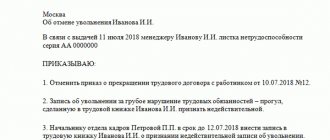5,00
5
| Reviews: | 1 | Views: | 4963 |
| Votes: | 1 | Updated: | n/a |
File type Text document
Document type: Application
?
Ask a question Remember: Contract-Yurist.Ru - there are a bunch of sample documents here
APPLICATION FOR CANCELLATION OF WILL To the First Moscow State Notary Office from gr. Ivanov Sergei Ivanovich, residing: Moscow, st. Chekhova, 10, apt. 7. STATEMENT Certified on February 7, 1978 according to register 2d-385 in your notary office on my behalf, I hereby cancel the will. City of Moscow, July seventeenth thousand. nine hundred and ninety-one. Signature Certification inscription of the state notary office Note. The testator has the right at any time to change or cancel the will he made by drawing up a new will or by submitting an application for cancellation of the will to the notary office that certified the will. The authenticity of the signature on the application to cancel the will must be certified in a notary office or the executive committee of the relevant Council of People's Deputies.
Download the document “Sample. Application to cancel a will"
Cancellation and modification of a will – Art. 1130 Civil Code of the Russian Federation
Let's give a definition first. A will is a legal document drawn up in writing denoting the will of a citizen (capacitated) regarding the distribution of his property, after his death, among his legal successors.
It is notarized and can be issued either for one person or for an unlimited number of persons, regardless of whether they are relatives of the testator or not.
Current legislation (Articles 1116 and 1119 of the Civil Code of the Russian Federation) allows things belonging to a person to be bequeathed during his lifetime after his death to a wide range of legal entities.
These include:
- Relatives, as well as persons who are not relatives.
- Stateless persons and foreigners.
- Domestic and foreign legal entities.
- The state and its subjects (entities).
- Other countries and international organizations.
The person who compiled it has the right to prescribe what property goes to a specific heir. The most important condition for its certification is the existence of rights to the property it replaces.
Sometimes there may be reasons on the basis of which the cancellation of a will by a notary is necessary. Regulates the procedure of Art. 1130 Civil Code of the Russian Federation. According to this norm, the drafter can cancel or change the will whenever he pleases, regardless of how much time has passed.
Nowhere does it say that the testator is obliged to indicate the reasons that prompted him to change the decision. Written or oral approval of heirs or other persons is not required to carry out this legal operation.
Note! The newly drawn up will does not need to indicate information that the previous one has completely or partially lost its validity. The law makes it possible for a citizen to express his will based only on his desires and without restrictions.
Cancellation procedure
As we have already said, the testator has the right to cancel a will at any time in his life, provided that at the time of cancellation he is of sober mind and sound memory and acts of his own free will and not under duress.
If after the death of the testator it turns out that he revoked the will while in a painful state (including a state of intoxication, including drugs), under duress, as a result of deception of third parties, or under the influence of threats, the heirs have the right to apply to the court with a claim for recognition of a will as valid or to declare a new will invalid.
An application to revoke a will can be submitted to any notary in any locality, regardless of who and where exactly the will was certified. The notary will enter an application to cancel the will in the Unified Register of Notarial Actions.
In accordance with the provisions of Art. 1130 of the Civil Code of the Russian Federation, the cancellation of a will is carried out by the testator personally in the presence of a notary chosen by him, and the latter must be convinced of the identity of the testator, his mental health and the voluntariness of his actions.
It is possible that, taking into account the age of the testator, the notary may require a doctor’s certificate.
The testator, without revoking the previous will, can draw up a new will for the same heirs, but with different conditions of inheritance, or for other heirs. In this case, there is no need to write a separate application to cancel the previous will, since by default the most recent will will always be valid.
An application to cancel a will or information about a new will is entered by a notary into the Unified Register of Notarial Actions. From this moment on, the fact of revocation of the will becomes available to every notary in the country. After the death of the testator, when opening an inheritance case, the notary will be able to check all the information on the testator’s testamentary actions.
How to cancel a will for an apartment during your lifetime
Most people bequeath real estate to their loved ones. This type of property appears most often when inheriting property. Is it possible to revoke a will while the testator is alive?
When a citizen has a desire to cancel a will he had previously drawn up, according to which an apartment is inherited, he can do this by drawing up a new document or by writing a special order canceling it.
The latest will of the apartment owner cancels all those previously drawn up by him (Part 2 of Article 1130 of the Civil Code of the Russian Federation). It is important that the same apartment appears in all documents. When a different living space is prescribed, we should talk about changing the will. The wording “cancellation” is no longer appropriate here.
The order itself has a specific purpose - to terminate the legal relationship. Then a new written and notarized will of the testator is drawn up.
Where to revoke a will
When it comes to bequeathed real estate, the entire procedure is carried out at the notary office, where this document was previously drawn up. Usually everything happens in the place where the testator permanently resides and the residential premises are located.
Another notary also has the right to terminate the will for an apartment. However, it is better to resort to this option as a last resort.
The procedure for revoking a will by a testator
How to revoke a will by the testator himself? It happens that a person decides to change his decision regarding the distribution of real estate between his relatives (third parties) after death.
To implement all this legally correctly, a certain algorithm of actions must be followed, namely:
- Determine whether it will be canceled partially or completely.
- Arrive at the notary, where you confirm your legal capacity to draw up a new document or an order to cancel it.
- Receive and keep one of the issued copies.
Taking into account the fact that we are talking about real estate, it is recommended to prepare the necessary documents in advance, the list of which will be given below. Without them, it will be impossible to carry out the procedure.
Order to revoke a will
It is drawn up by a notary, and terminates the validity of a will executed earlier (Article 1130 of the Civil Code of the Russian Federation).
The text itself is drawn up independently, or with the help of a notary, but from the words of the testator or in the presence of a witness, information about whom is also recorded so that disputes about the person’s legal capacity do not arise in the future. Law practice says that challenging them is very common, since an apartment is the most common object of inheritance.
The notary's act in question contains information without which it will not be considered valid and given legal force.
These include:
- Name;
- full passport data of the originator;
- data (number, where and who compiled what is indicated) which is cancelled;
- living space parameters;
- its essence with the phrase “cancel”;
- column stating that the compiler is familiar with the requirements of Art. 1130 Civil Code of the Russian Federation;
- Additional Information;
- where it will be stored, how many copies have been made;
- signature (with transcript) date;
- notary's seal.
It is usually compiled in 2 (two) copies. The first is kept in the notary's office - the other directly with the testator.
Let's emphasize! There is no need to formalize an order if a new will is being drawn up. According to the law, it will automatically cancel the previously issued one.
Required documents
When it comes to such sensitive issues as inheritance, real estate, then when carrying out any legal actions they will definitely be required, as mentioned above. Without them, no notary will perform any actions.
In this case, their list is as follows:
- Passport.
- A copy of the will.
- Certificates of title for residential premises.
- Certificates indicating the absence of encumbrances on the property.
The notary, before starting to fill out the form, checks them. Determines their authenticity and validity period.
Costs: briefly about the notary fee
Each notary has his own price list for the execution of a particular contract or agreement. In Moscow and the Moscow region of the Russian Federation, the tariff will be 500 (five hundred) rubles, for drawing up a cancellation order, plus legal and technical services - 500 (five hundred) rubles.
In the regions, prices are not lower for this type of notary services. The state fee for this procedure is also 500 (five hundred) rubles. It is the same in all subjects of the Russian Federation.
If cancellation is made, what are the consequences?
When this happens, and another will is not executed, then after the death of the testator, his living space is inherited by law, in order of priority, by close relatives of the deceased.
If there is a new document, the circle of persons indicated in it will inherit the property bequeathed to them. If there are obligatory legal successors, then they receive, regardless of the will of the deceased, at least half of the share that would be due to them by law.
A previously written will is not restored and loses its validity.
Related documents
- Sample. Certificate of right of inheritance by law
- Sample. Certificate for entering into an inheritance for residential premises in housing complexes and residential complexes
- Sample. Inventory act
- Sample. Application for acceptance of inheritance
- Certificate of right to inheritance under a will (option 1)
- Certificate of right to inheritance under a will (option 2)
- Certificate of right to inheritance by law (option 1)
- Certificate of right to inheritance by law (option 2)
- Certificate of right to inheritance by law (option 3)
- Certificate of right to inheritance by law (option 4)
- Certificate of right to inheritance by law (option 5)
- Certificate of right to inheritance by law (option 6)
- Certificate of right to inheritance by law (option 7)
- Inventory act
- Affidavit
- Documents expressing the will of the testator; sample wills
- Application for confirmation of family relationship
- Application for acceptance of inheritance
- Will (option 1)
- Will (option 2)
- Will (option 3)
- Will (option 4)
- Will (several persons, testamentary refusal)
- Will (one person)
- Application for refusal to share in inheritance
- Sample. Act on the impossibility of taking measures to protect inherited property
- Sample. Act on the impossibility of taking measures to protect inherited property
- Sample. Act on the impossibility of taking measures to protect inherited property (option 1)
- Sample. Agreement on division of inherited property
- Sample. Agreement on the division of inherited property with the participation of a representative and on behalf of a minor
- Sample. A will at the place of treatment in favor of a legal entity (sub-appointment of an heir, deprivation of the right to inherit, signing of a will by another person due to the illness of the testator)
- Sample. Will at the place of treatment of all property owned
- Sample. Will at the place of treatment of part of the property
Possible reasons and life situations
A person’s life is multifaceted, and therefore a lot of events occur during it that influence the decisions he previously made. The legislation also provides for this nuance.
The testator has the right to change his will regarding the distribution of his property among legal successors due to subjective and objective reasons that have arisen.
The most common reasons that prompt a person to take such steps include:
- desire to change the list of heirs, to include or exclude someone;
- there is a need to review shares and redistribute them between specified or third parties;
- additional conditions are required to be included in the text;
- the financial situation and health of the testator have deteriorated significantly;
- There are acute and irreconcilable conflicts with legal successors.
It is not necessary to indicate anywhere in writing or orally the reasons that prompted a person to change his will. Although people often talk about what forced them to take such a step.
What you can and can't do with a will
The current legislation clearly regulates what rights the testator is entitled to when writing it and what subsequent actions he can take.
Here we should take into account the presence of obligatory heirs (incapacitated, dependents, minors) who, by law, also have the right to receive part of the inheritance.
Often, a person’s legal successors after his death may not agree with the dying will of the deceased. They have the right to put forward their point of view, justify and defend it in court. The law does not prohibit this.
Is it possible to cancel a will with another notary?
Usually this action is carried out in the notary office where it was drawn up. However, it happens that a notary is absent for a long time or has ceased notarial practice. In such a situation, it is allowed to carry out this procedure with another notary.
When contacting it, it is recommended:
- inform who and where previously executed the document;
- send a photocopy of the order (will) by letter;
- upon termination of the activities of the notary who compiled it, a request is sent to clarify all the circumstances.
You must have a civil passport and a copy of the will with you. If it is not on hand for any reason, a request is made through a centralized database. After receiving an official response, the procedure continues.
Is it possible to revoke a will if the testator has died?
As noted above, the heirs may not agree with the decision of the deceased relative to distribute the property he acquired among his legal successors after he “passed on to another world.”
It is known that mostly citizens apply for it in old age, sometimes without realizing the actions they are taking. This worries the testator's relatives. The law allows legal challenge of this document by the legal successors of the deceased.
The primary right to do this, if there are objections to the stated will of the citizen (Article 1131 of the Civil Code of the Russian Federation), has:
- children;
- surviving spouse;
- mother and father.
To do this, you need to file a statement of claim in court, where you outline your requirements in detail and pay a state fee of 300 rubles.
Before carrying out this procedure and counting on a positive decision from the judge, there must be grounds for invalidating the will.
Is it possible to change a will and how to do it correctly?
In this case, it is not completely canceled, but only some of its points, at the request of the testator. In accordance with the law, this can only be done by drawing up a new document to which changes will be made. It is not possible to replace or correct individual paragraphs or sentences of an already existing version of the text.
You must have your passport and will with you. All wording and adjustment parameters should be developed in advance.
In accordance with Art. 1130 and 1132 of the Civil Code of the Russian Federation, provided that several of them have been drawn up, the legal successors will inherit according to several documents or according to the latest most recent drafting.
Cancellation of a will and compulsory share
The right to an obligatory share in the inheritance in accordance with the provisions of Art. 1149 of the Civil Code of the Russian Federation have:
- disabled parents, spouse and children of the testator;
- dependents who were supported by the testator for at least a year before his death.
Let us immediately note that a mandatory share and a will are unrelated legal phenomena.
Persons entitled to a mandatory share may or may not be specified in the will. If they are included in the will, they receive the inheritance in accordance with the will. If not included, they receive their obligatory share, equal to half of the share that they would inherit in the general order by law.
Thus, if a testator cancels a will in which persons entitled to an obligatory share were included as heirs, he does not in any way cancel the obligatory share.
Is a gift agreement a substitute for a will?
The two legal relationships are partially similar. These are unilateral transactions, according to which the donee and the heir receive the immovable (movable) property of the testator or donor free of charge.
However, they have significant differences, namely:
- A deed of gift for an apartment involves the transfer of ownership within 5 days after registration of the transaction with the Rosreestr authorities. Whereas, according to the will, this will happen only six months after the death of its owner (that is, it is still unknown when and in what form and condition).
- The heir uses the property only after the death of the testator, while the donee uses it much more quickly.
- The testator can repeatedly change his will, while with a deed of gift everything is much more complicated.
It is possible to draw up a deed of gift and transfer specific property during your lifetime. The gift agreement does not terminate the validity of the will, but part of the property passes to the new owner until the death of the previous owner.
Cancellation of a will made under emergency circumstances
Some people have unforeseen situations that may prompt them to write a will in urgent circumstances - natural disasters, military operations, cataclysms.
There is not always a notary nearby; he may not be available in the area at all. The law (Article 1129 of the Civil Code of the Russian Federation) then allows a person to express his will in writing without notarization, but in the presence of two witnesses, and always with his signature with a transcript.
However, a month after the unforeseen circumstances disappear, this document loses its force, that is, it will be canceled automatically if the person remains alive. Therefore, if a citizen wants to leave his will in force, he must register his will within 30 days.
If you want to cancel it, just don’t do it, it will cease to operate on its own, and then create a new one. Another reason for its termination is the absence of a signature and two witnesses when writing it.
Often people make closed wills. It is drawn up by the citizen in his own hand in the presence of two witnesses.
Then they are handed over in an envelope to a notary, on which the signatures of the persons present during this procedure are affixed. The text of the will is known only to the testator (Article 1126 of the Civil Code of the Russian Federation). It can be opened within 15 days after his death, by the notary with whom it is kept.
The cancellation procedure is identical to that with an open option. A citizen can come to a notary’s office at any time and draw up a new document.
Cancellation of a will by a notary
In order to cancel a will drawn up earlier, the testator does not have to contact the notary who certified the previous document.
By contacting any notary, he can cancel a previously drawn up will in two ways:
- having drawn up and certified an order to cancel it;
- having drawn up and certified a new will, the contents of which distribute the inherited property specified in the previous will in a completely different way in the event of his death.
The testator may also include in the new will a special instruction to cancel the previous one.
How can you change your will?
The topic of canceling or changing a will is discussed in the video we offer you.
In what cases can relatives cancel?
Close (relatives) belonging to the first line of heirs can resort to the procedure. To challenge a will, it is necessary to have grounds that cast doubt on the validity of the document. Special and general reasons can be distinguished.
The first group includes:
- There are several compilers.
- Seals, signatures and other details have been forged.
- The will was expressed through representatives.
- Pressure was put on the person.
- The official has no rights to certify the legal relationship that has arisen.
- There were no witnesses when there should have been.
All these facts can serve as grounds for challenging the will. No exculpatory statements of other persons will play a role, since the procedural order must be observed.
The second group includes:
- The rights of obligatory heirs are violated.
- The testator was incompetent.
- The text was written under pressure from third parties and did not reflect the will of the person.
- The will is fabricated (fake).
- The above is contrary to the law.
- There are inaccurate wording and errors in the text that do not reflect its meaning.
- Compiled in a state of alcoholic or drug intoxication (stupefying).
During the trial, evidence is carefully collected, handwriting and other examinations are initiated, and witnesses are heard, including a notary. The court's decision may be appealed to a higher authority in the future.
Note! A person whose rights have actually been violated by a document can make claims and defend their rights.







